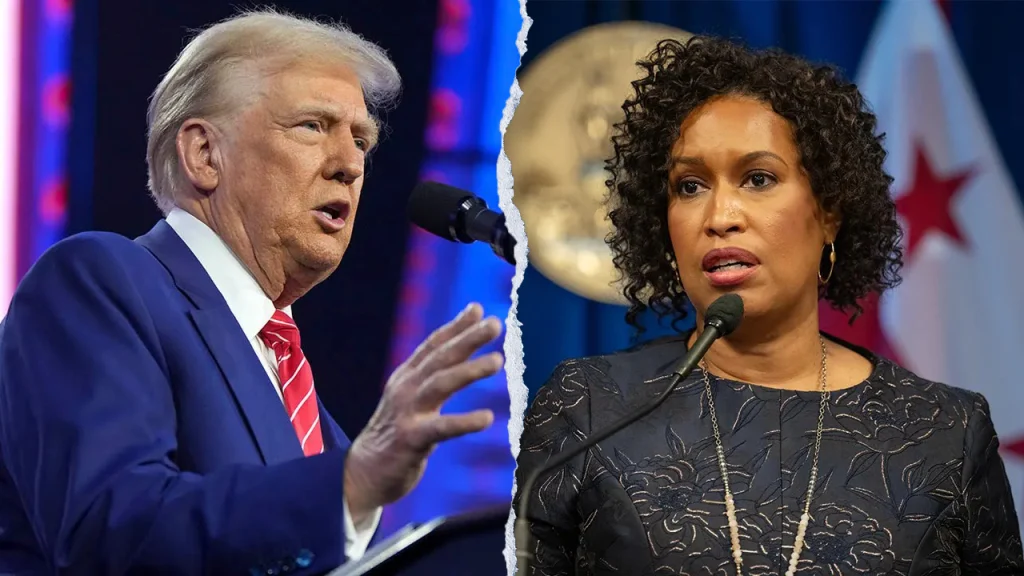The Political Landscape: A New Era Dawns in Washington
The political arena is abuzz with anticipation as the incoming Trump administration prepares to take the reins of power. This period of transition is marked by both collaboration and contention, with various power players jockeying for position and influence. The relationship between President-elect Trump and Washington D.C. Mayor Muriel Bowser exemplifies this dynamic. Despite past friction, particularly during the 2020 George Floyd protests, the two leaders have found common ground in their shared desire to enhance the nation’s capital. Their meeting focused on potential collaborations between local and federal government, highlighting areas such as federal workforce management, utilization of federal buildings, and infrastructure development. This cooperative spirit suggests a potential for bipartisan progress on issues of mutual concern.
Policy Clashes and Controversies on the Horizon
While cooperation is evident in some areas, significant policy disagreements continue to shape the political landscape. President-elect Trump’s impending inauguration is shadowed by a series of controversial decisions and policy reversals. One prominent example is the proposed 20-year ban on oil and gas leases in Nevada’s Ruby Mountains, a move met with opposition from industry groups and some local communities. Another contentious issue is the fate of a controversial immigrant program. Democratic lawmakers are urging an extension, while Trump has signaled his intention to cut the program, a stance that will likely spark further debate and legal challenges. These policy clashes highlight the stark ideological divides that continue to shape American politics.
International Relations and Domestic Challenges
On the international stage, the United States is playing a key role in addressing global energy concerns. Amidst fresh supply fears, Ukraine has received its first shipment of natural gas from the US, a move that underscores America’s commitment to supporting its allies and stabilizing global energy markets. Domestically, the political landscape is marked by a complex interplay of legislative battles and legal challenges. The upcoming Speakership fight in the House of Representatives is gaining momentum, with Trump endorsing Representative Kevin McCarthy for the position. Senator Bernie Sanders is poised to spearhead legislation related to a key Trump proposal, signaling a potential for bipartisan collaboration on economic policy. Meanwhile, legal battles continue to unfold, with the Georgia Attorney General urging the state Supreme Court to reject District Attorney Fani Willis’ appeal in a case involving Trump.
Justice and Accountability: Navigating Legal and Ethical Dilemmas
The pursuit of justice and accountability is a recurring theme in the current political climate. The sentencing of a North Dakota senator’s son to 28 years in prison for a fatal crash that killed a deputy sheriff highlights the consequences of reckless actions and the importance of upholding the rule of law. Meanwhile, the decision by Immigration and Customs Enforcement (ICE) to shut down programs offering services to illegal immigrants, citing immense costs, is likely to spark renewed debate about immigration policy and resource allocation. The ongoing legal battle surrounding 9/11 plea deals further complicates matters, with the Pentagon chief’s bid to reject the deals being denied by a military appeals court. These cases underscore the complex legal and ethical challenges facing the nation.
Economic Concerns and Policy Debates
Economic issues continue to dominate the political discourse, with concerns about affordability and the potential impact of new policies on working families. New York Governor Kathy Hochul’s "polluters pay" bill has drawn criticism from economists who argue that it could result in regressive costs for lower-income households. This debate highlights the challenges of balancing environmental protection with economic realities and the need for careful consideration of the distributional effects of policy interventions. As the new administration prepares to assume power, economic policy will undoubtedly remain a central focus of political debate.
The Path Forward: Navigating Uncertainty and Building Consensus
The political landscape is characterized by a mix of cooperation, contention, and uncertainty. As the Trump administration takes shape, the nation faces a range of complex challenges, from international relations and domestic policy to economic concerns and legal battles. Navigating these challenges will require a combination of pragmatic leadership, bipartisan collaboration, and a commitment to finding common ground. The ability to build consensus across ideological divides will be crucial to addressing the nation’s most pressing issues and ensuring a stable and prosperous future. The coming months will be critical in shaping the direction of the country and defining the legacy of the new administration.

